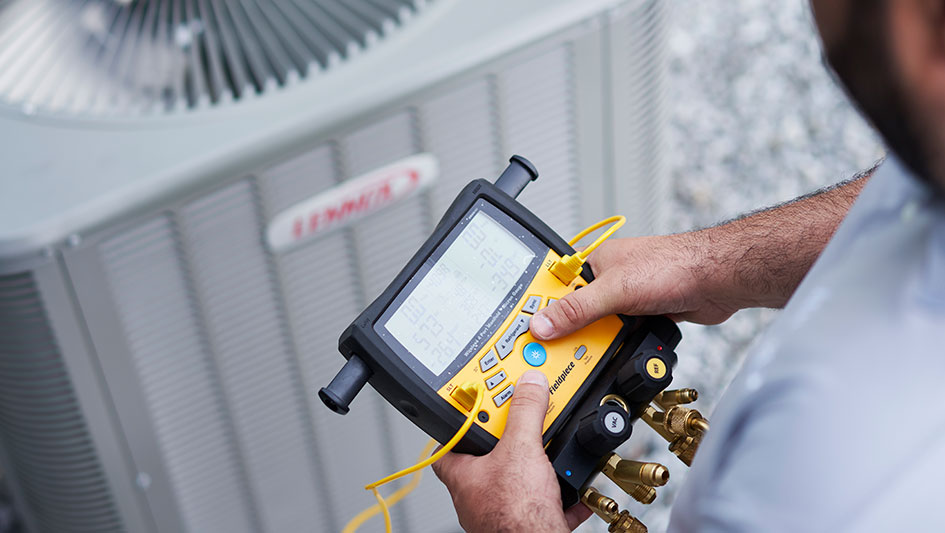
If you’re considering a new, high-paying career, look no further than heating, ventilation and air conditioning. HVAC is one of the fastest-growing careers offered, according to the U.S. Bureau of Labor Statistics, which estimates careers in this industry will increase by 13 percent by 2028.
There are several reasons why these jobs are increasing so fast. One is homeowners tapping into government rebates to purchase more energy-efficient comfort systems. Then there’s the end of R-22 Freon® refrigerants, which influences old equipment. Lastly, there’s the red-hot housing market and a house shortage that’s driven a bump in new construction houses.
One of the number one needed positions is working as an HVAC technician. Find out about what they do, how to become one and about how much you can expect to receive.
What Is an HVAC Technician?
An HVAC technician is a person who fixes, installs and maintains heating and cooling units. Most work with both homeowners and business owners. And, most important, you’ll be knowledgeable about:
- Air conditioners
- Furnaces
- Mini-splits and heat pumps
- Thermostats and home zoning
- Indoor air quality products including air filters and air purification systems
Some are HVAC-R professionals, which means they also can do refrigeration.
Is Working in HVAC Difficult?
While HVAC can be physically hard, it can also be highly satisfying. As a technician you’ll need to be able to:
- Work in uncomfortable settings, like crowded or dirty spaces.
- Work in hot or cold areas because equipment is usually outdoors.
- Work evenings, weekends and overtime during peak times.
One of the most common misconceptions about HVAC is that it’s a blue-collar position. You have to have a distinct skill set, extensive training and ongoing qualifications.
It’s a fantastic career option if you want to:
- Not be saddled with a lot of educational debt.
- Avoid sitting at a desk or in an office.
- Have job security being sure your position can’t be outsourced.
- Work as your own boss and have your own successful business.
Steps for Becoming a Professional HVAC Technician
To become an HVAC technician, you’ll need a high school diploma or GED, in addition to comprehensive instruction. Other more specialized (and higher paying) HVAC jobs typically need extra instruction or endorsements.
You can become certified by attending classes at a community college or trade school. How long it takes to become an HVAC technician depends on the program, which is typically six months to two years. Your employer could also expect NATE certification. This refers to North American Technician Excellence, this industry-leading certification increases your technical knowledge to help you better serve customers.
Career Explorer noted that technicians who can work with tablets, electronics and troubleshooting will be in large demand as equipment becomes more technologically advanced.
Another benefit of working in HVAC is little to no student debt.
According to Midwest Technical Institute, attending a technical or trade school typically is around $15,000. A community college usually costs around $5,000 annually. By comparison, the average student debt for a bachelor’s degree is $25,921.
Common Duties of an HVAC Technician
Your work schedule might vary depending on your employer. If you do repairs, you might work early, late or be on call. If you work in construction/home building or management, you might have more of a fixed schedule during usual business hours.
As a technician, you’ll respond to different locations for repair, maintenance or installation jobs. Some work might require more time than others, so the number of calls you can go on may vary.
As we mentioned previously, you should be comfortable working outdoors in extreme weather, as well as in dirty or cramped spaces. If you work in a customer-facing role, strong customer service skills are always a plus.
Potential Compensation for {Professional Technicians|Technicians|Full-Time Technicians and Similar HVAC Jobs
Because HVAC is a rapidly expanding industry, your salary will reflect it. The national average salary for an HVAC technician is $49,242, according to ZipRecruiter. Top earners make between $56,600 and $68,000. However, salaries might be different based on your area and its cost of living.
Aside from having your own business, there are a few additional career opportunities. These can be:
HVAC manager, $72,515 average salary
HVAC service manager, $71,176 average salary
Where the Demand for HVAC Technicians Is Highest
HVAC technicians are in demand across the United States, but even more so in Florida, California, Texas, New York and Illinois. According to hvacclasses.org, these states employ the highest number of HVAC workers and are experiencing high construction growth. Here’s why:
- Florida: Hurricanes, educational and healthcare locations.
- California: Wildfires, transportation, energy and utility upgrades.
- Texas: Hurricanes, energy, utility and other infrastructure upgrades.
- New York: Residential and infrastructure updates.
- Illinois: Companies moving to the Chicago area.
Where HVAC Technicians Will Be in High Demand in the Future
Projections Central, who creates long-term occupational projections, anticipates these states to have the highest demand for technicians by 2028:
- Utah, 31.1%
- Colorado, 29.7%
- Nevada, 27.9%
- Arizona, 21.4%
- Iowa, Oregon and Montana, 18.5%
- Arkansas, 16.3%
- Florida, 16.2%
- South Carolina, 16%
- Texas, 15.9%
- Idaho, 15.7%
- Washington, 15.6%
- North Carolina, 15.5%
- Tennessee, 15.2%
- Wyoming, 14.3%
- Nebraska, 13.9%
- Indiana, 13.8%
- North Dakota, 13.8%
Here’s where the greatest number of new jobs during that time frame are expected to be:
- Florida, 5,420
- Texas, 5,530
- California, 4,100
- North Carolina, 2,510
- New York, 2,290
- Colorado, 2,000
- Ohio, 1,550
- Pennsylvania, 1,510
- Virginia, 1,500
- Tennessee, 1,360
- Washington, 1,290
- Georgia, 1,270
- New Jersey, 1,170
- Utah, 1,170
- South Carolina, 1,1060
- Indiana, 940
- Maryland, 820
- Missouri and Arizona, 810
- Michigan, 780
Weather and economic improvement is expected to fuel increases in these states, according to hvacclasses.org.
Grow Your HVAC Career with All Solutions Heating & Cooling
HVAC technicians remain in demand across the USA and in Beaverton. To learn more more about our openings, see our careers page or reach us at 971-245-2459 today!



